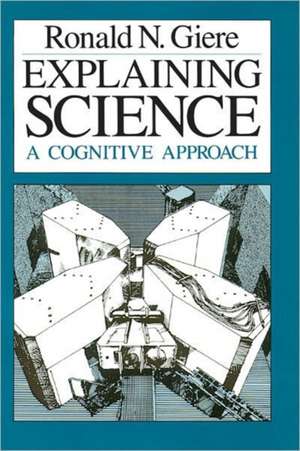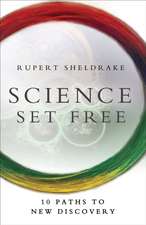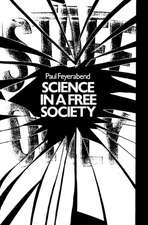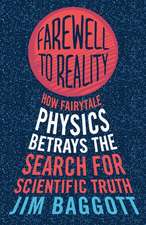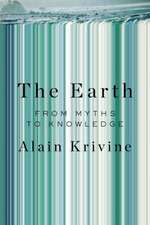Explaining Science: A Cognitive Approach: Science and Its Conceptual Foundations series
Autor Ronald N. Giereen Limba Engleză Paperback – 15 mai 1990
"This volume presents an attempt to construct a unified cognitive theory of science in relatively short compass. It confronts the strong program in sociology of science and the positions of various postpositivist philosophers of science, developing significant alternatives to each in a reeadily comprehensible sytle. It draws loosely on recent developments in cognitive science, without burdening the argument with detailed results from that source. . . . The book is thus a provocative one. Perhaps that is a measure of its value: it will lead scholars and serious student from a number of science studies disciplines into continued and sharpened debate over fundamental questions."—Richard Burian, Isis
"The writing is delightfully clear and accessible. On balance, few books advance our subject as well."—Paul Teller, Philosophy of Science
"The writing is delightfully clear and accessible. On balance, few books advance our subject as well."—Paul Teller, Philosophy of Science
Din seria Science and Its Conceptual Foundations series
-
 Preț: 230.29 lei
Preț: 230.29 lei -
 Preț: 455.81 lei
Preț: 455.81 lei -
 Preț: 431.17 lei
Preț: 431.17 lei -
 Preț: 288.59 lei
Preț: 288.59 lei -
 Preț: 231.00 lei
Preț: 231.00 lei -
 Preț: 191.68 lei
Preț: 191.68 lei -
 Preț: 274.82 lei
Preț: 274.82 lei -
 Preț: 443.89 lei
Preț: 443.89 lei -
 Preț: 358.60 lei
Preț: 358.60 lei -
 Preț: 301.88 lei
Preț: 301.88 lei -
 Preț: 498.55 lei
Preț: 498.55 lei -
 Preț: 392.61 lei
Preț: 392.61 lei -
 Preț: 352.99 lei
Preț: 352.99 lei -
 Preț: 347.24 lei
Preț: 347.24 lei -
 Preț: 320.04 lei
Preț: 320.04 lei -
 Preț: 448.30 lei
Preț: 448.30 lei -
 Preț: 389.89 lei
Preț: 389.89 lei -
 Preț: 317.33 lei
Preț: 317.33 lei -
 Preț: 496.35 lei
Preț: 496.35 lei -
 Preț: 435.78 lei
Preț: 435.78 lei -
 Preț: 401.43 lei
Preț: 401.43 lei -
 Preț: 447.32 lei
Preț: 447.32 lei -
 Preț: 387.98 lei
Preț: 387.98 lei -
 Preț: 233.11 lei
Preț: 233.11 lei -
 Preț: 385.65 lei
Preț: 385.65 lei -
 Preț: 331.75 lei
Preț: 331.75 lei -
 Preț: 270.07 lei
Preț: 270.07 lei -
 Preț: 268.20 lei
Preț: 268.20 lei - 15%
 Preț: 194.45 lei
Preț: 194.45 lei - 22%
 Preț: 689.51 lei
Preț: 689.51 lei - 23%
 Preț: 583.39 lei
Preț: 583.39 lei - 10%
 Preț: 306.24 lei
Preț: 306.24 lei - 15%
 Preț: 264.92 lei
Preț: 264.92 lei
Preț: 294.80 lei
Nou
Puncte Express: 442
Preț estimativ în valută:
56.41€ • 59.02$ • 46.86£
56.41€ • 59.02$ • 46.86£
Carte tipărită la comandă
Livrare economică 02-16 aprilie
Preluare comenzi: 021 569.72.76
Specificații
ISBN-13: 9780226292069
ISBN-10: 0226292061
Pagini: 344
Dimensiuni: 152 x 229 x 28 mm
Greutate: 0.51 kg
Ediția:1
Editura: University of Chicago Press
Colecția University of Chicago Press
Seria Science and Its Conceptual Foundations series
ISBN-10: 0226292061
Pagini: 344
Dimensiuni: 152 x 229 x 28 mm
Greutate: 0.51 kg
Ediția:1
Editura: University of Chicago Press
Colecția University of Chicago Press
Seria Science and Its Conceptual Foundations series
Notă biografică
Ronald N. Giere is professor of philosophy at the University of Minnesota. He is the author of Understanding Scientific Reasoning.
Cuprins
List of Figures
Preface
Acknowledgments
1. Toward a Unified Cognitive Theory of Science
What Might a Cognitive Theory of Science Be?
Rationality, Relativism, and Cognition
Representation and Judgment
Naturalistic Realism
Can the Philosophy of Science Be Naturalized?
Must the Naturalistic Study of Science Be Viciously Circular?
Evolutionary Naturalism
What Might a Cognitive Theory of Science Be Like?
A Role for History?
Overview of This Book
2. Theories of Science
Logical Empiricism
The Social Structure of Science
Paradigms and Revolutions
Programs and Traditions
Constructive Empiricism
The Strong Program
Laboratory Studies
The Sociological Analysis of Scientists' Discourse
3. Models and Theories
The Science Textbook
The Organization of a Mechanics Text
The Linear Oscillator
Interpretation and Identification
The Laws of Motion
Models and Hypotheses
What Is a Scientific Theory?
What about Axiomatic Presentations of Mechanics?
Beyond Classical Mechanics
4. Constructive Realism
Respects of Similarity
Varieties of Empiricism
Unrestricted Realism
Metaphysical Realism
Modal Realism
Laws as Universal Generalizations
Causal Models and Causal Explanations
Realistic Rejoinders
5. Realism in the Laboratory
Contingency and Negotiation
Producing Protons
Using Protons
Experimentation and Realism
The Limitations of Empiricism
The Limitations of Constructivism
Geometrical Cognition in Nuclear Research
The Role of Technology in Scientific Research
6. Scientific Judgment
Scientists as Decision Makers
Basic Decision Models
Bayesian Decision Models
Are Scientists Bayesian Agents?
Satisficing Models
Scientists as Satisficers
Experimental Tests
Philosophical Objections
The Role of Probability in Science
7. Models and Experiments
Models of the Nuclear Potential
Background to the Pursuit of Relativistic Dirac Models
Response to the New Data
Why Successful Predictions Matter
Further Evidence
The Design and Execution of an Experimental Test
Cognitive Resources and Scientific Interests
An Evolutionary Picture
The Future of Dirac Models in Nuclear Physics
8. Explaining the Revolution in Geology
Contractionist Models
Wegener and Continental Drift
Wegener's Critics
Oceanography and Paleomagnetism
Seafloor Spreading
The Vine-Matthews Hypothesis
The Juan de Fuca Ridge
The Vindication of Seafloor Spreading
Mobilism Becomes a Satisfactory Option
Revolution or Evolution?
Epilogue: Reflexive Reflections
Notes
References
Index
Preface
Acknowledgments
1. Toward a Unified Cognitive Theory of Science
What Might a Cognitive Theory of Science Be?
Rationality, Relativism, and Cognition
Representation and Judgment
Naturalistic Realism
Can the Philosophy of Science Be Naturalized?
Must the Naturalistic Study of Science Be Viciously Circular?
Evolutionary Naturalism
What Might a Cognitive Theory of Science Be Like?
A Role for History?
Overview of This Book
2. Theories of Science
Logical Empiricism
The Social Structure of Science
Paradigms and Revolutions
Programs and Traditions
Constructive Empiricism
The Strong Program
Laboratory Studies
The Sociological Analysis of Scientists' Discourse
3. Models and Theories
The Science Textbook
The Organization of a Mechanics Text
The Linear Oscillator
Interpretation and Identification
The Laws of Motion
Models and Hypotheses
What Is a Scientific Theory?
What about Axiomatic Presentations of Mechanics?
Beyond Classical Mechanics
4. Constructive Realism
Respects of Similarity
Varieties of Empiricism
Unrestricted Realism
Metaphysical Realism
Modal Realism
Laws as Universal Generalizations
Causal Models and Causal Explanations
Realistic Rejoinders
5. Realism in the Laboratory
Contingency and Negotiation
Producing Protons
Using Protons
Experimentation and Realism
The Limitations of Empiricism
The Limitations of Constructivism
Geometrical Cognition in Nuclear Research
The Role of Technology in Scientific Research
6. Scientific Judgment
Scientists as Decision Makers
Basic Decision Models
Bayesian Decision Models
Are Scientists Bayesian Agents?
Satisficing Models
Scientists as Satisficers
Experimental Tests
Philosophical Objections
The Role of Probability in Science
7. Models and Experiments
Models of the Nuclear Potential
Background to the Pursuit of Relativistic Dirac Models
Response to the New Data
Why Successful Predictions Matter
Further Evidence
The Design and Execution of an Experimental Test
Cognitive Resources and Scientific Interests
An Evolutionary Picture
The Future of Dirac Models in Nuclear Physics
8. Explaining the Revolution in Geology
Contractionist Models
Wegener and Continental Drift
Wegener's Critics
Oceanography and Paleomagnetism
Seafloor Spreading
The Vine-Matthews Hypothesis
The Juan de Fuca Ridge
The Vindication of Seafloor Spreading
Mobilism Becomes a Satisfactory Option
Revolution or Evolution?
Epilogue: Reflexive Reflections
Notes
References
Index
